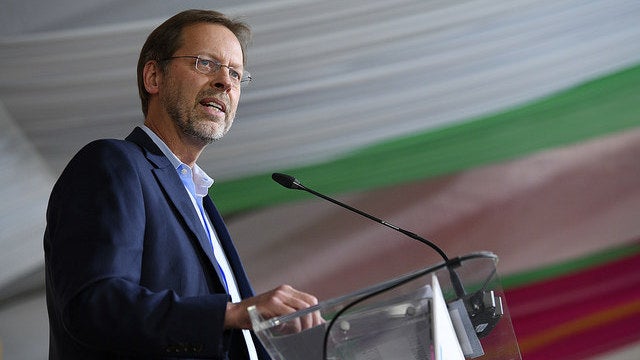More than one billion people across the globe do not have access to basic health services. They live in communities that are not only geographically remote but are more broadly defined as the hardest to serve communities around the world. These communities include remote villages in rural Rwanda as well as poor urban neighborhoods of Nairobi or New York City, each overlooked by essential health systems due to poverty, race, geography, or education.
We cannot rely on existing systems to address health challenges for the hardest to serve. Achieving global health objectives demands integrating the public and private sectors, technology, field experts, funders and entrepreneurs to drive innovative and equitable solutions to communities at the last mile. In this light, the Aspen Global Innovators Group has committed to galvanize energy around last mile health issues, building an action-oriented space for decision-makers to work through complex ideas together: The Aspen Ideas Incubator.
To kick off the annual Spotlight Health conference, the Aspen Ideas Incubator gathers a group of 40 global and community health experts and practitioners to workshop 3 innovations that serve communities at the last mile. Using an explicit equity lens, the group participates in a curated set of conversations to drive new insights, actions, and commitments.
From June 19-21, the Aspen Ideas Incubator group tackled three big questions:
1. How do we allow African students from rural, poor backgrounds to access and pay for high-quality health education?
2. What will it take to build an outcomes fund that closes the huge financial gap to support community health programs in sub-Saharan Africa?
3.How can a coalition of successful practitioner organizations inform the design and implementation of high-impact, large-scale community health worker programs?
Dr. Agnes Binagwaho, Vice Chancellor of the University of Global Health Equity and former Minister of Health of Rwanda, launched the 2018 Aspen Ideas Incubator with a commitment – a commitment to training the next generation of global health leaders in Africa who will serve the most vulnerable. High quality education, however, is costly, particularly for students from rural, poor backgrounds. Future global health leaders, Dr. Binagwaho declared, need a student finance mechanism that is responsive to equity. We need a more sustainable solution that differs from historically crippling loan systems and that is not reliant on scholarship support alone.
Phyllis Costanza, CEO of the UBS Optimus Foundation, and David Milestone, Acting Director of USAID’s Center for Accelerating Innovation and Impact, presented the second idea, an outcomes fund for community health. There is growing interest in community health worker programs, which are proven to improve access to basic healthcare and to reduce maternal and child mortality in the poorest and most remote communities around the world. Still, there is an estimated $2 billion funding gap to support community health worker programs in sub-Saharan Africa. How can we harness donor interest to close this gap and increase funding opportunities for high-impact implementing organizations?
Finally, Madeleine Ballard, joined by representatives from Muso and Last Mile Health, introduced the Community Health Impact Coalition, a growing collaborative effort leveraging practitioner experience to support the design and implementation of large-scale community health worker programs. With so much publicity on the power of community health worker programs, Ballard noted, we must recognize that traditional community health systems do not always provide health workers with the support they need to succeed. Working together, we can collect best practices and better inform standards for community health worker programs. Powerful collaboration, however, can be complex and uncoordinated; how can a coalition really drive improved health outcomes?
These 3 issues – and their corresponding solution ideas – were workshopped by the full Aspen Ideas Incubator group, including representatives from 4 Ministries of Health, the Gates Foundation, USAID, Last Mile Health, Muso, Ashesi University, and Social Finance. During two full days of expert-led discussion and collaborative workshop sessions, the group uncovered assumptions, developed new paths forward, and unlocked commitments from public and private sector partners. Three key solution ideas emerged:
1. Philanthropic, private-sector, and lending partners must all be engaged to increase student financing options while ensuring graduates will serve rural poor communities Early in the Ideas Incubator, the University of Global Health Equity shifted its focus from tuition financing to its university business model. The group considered how to lower costs per student and increase additional revenue streams to offset tuition fees. At the same time, the group recognized that its mission is not only to provide low-income students with high-quality health education, but also to place its graduates back in low-income, rural communities and serve the most vulnerable. With input from Aspen Institute President Dan Porterfield, the University agreed it must use existing assets, including student testimonials and powerful connections, to drive increased investment from donors, lending partners and future employers. These partners, through loan forgiveness, income-sharing, and scholarships, could both offset existing costs and create secure job placements for graduates.
2. Private donors need a clear value proposition to build an equitable community health outcomes fund: The full Incubator group agreed there is a major opportunity to engage private donors in financing community health programs using an outcomes-based model. In this model, private donors would contribute capital to a pooled fund in return for improved health outcomes, like reduced child mortality rates or increased number of visits to rural households. In designing a community health outcomes fund, however, aligning incentives is critical: an outcomes funder must set reasonable metric goals, and the implementing partner must be able to meet those metric goals. At the same time, private donors will only contribute to an outcomes fund if a clear value proposition is communicated. An investment case, reasonable and equitable metrics, and a specific geographic focus will be fundamental in raising outcomes funding.
3. A high-impact coalition for community health will include donors, governments and other partners to inform best practices, funding, and technical assistance: Collaboration is urgently needed to drive improved health outcomes at scale and strengthen community health worker programs across sub-Saharan Africa. Still, few incentives exist to work in collaboration. With this in mind, the Community Health Impact Coalition group committed to operationalize a long-term, sustainable business model focused on advocacy and technical assistance. The group agreed this model must engage donor and government partners as well as implementing organizations. Strategic partners, including AMP Health’s Ministry of Health partners, will allow the Coalition to build technical assistance resources alongside local bodies, increasing coordination, powerful shared learnings, and dissemination of best practices.
Participants left the Aspen Ideas Incubator event and entered Spotlight Health with resolve and determination to carry key learnings forward. Above all, participants agreed that innovative thinking, unlikely partnerships, and increased coordination will be critical to uncovering new solutions to address health challenges at the last mile.
Outcomes from previous Aspen Ideas Incubator events can be found here and here.


